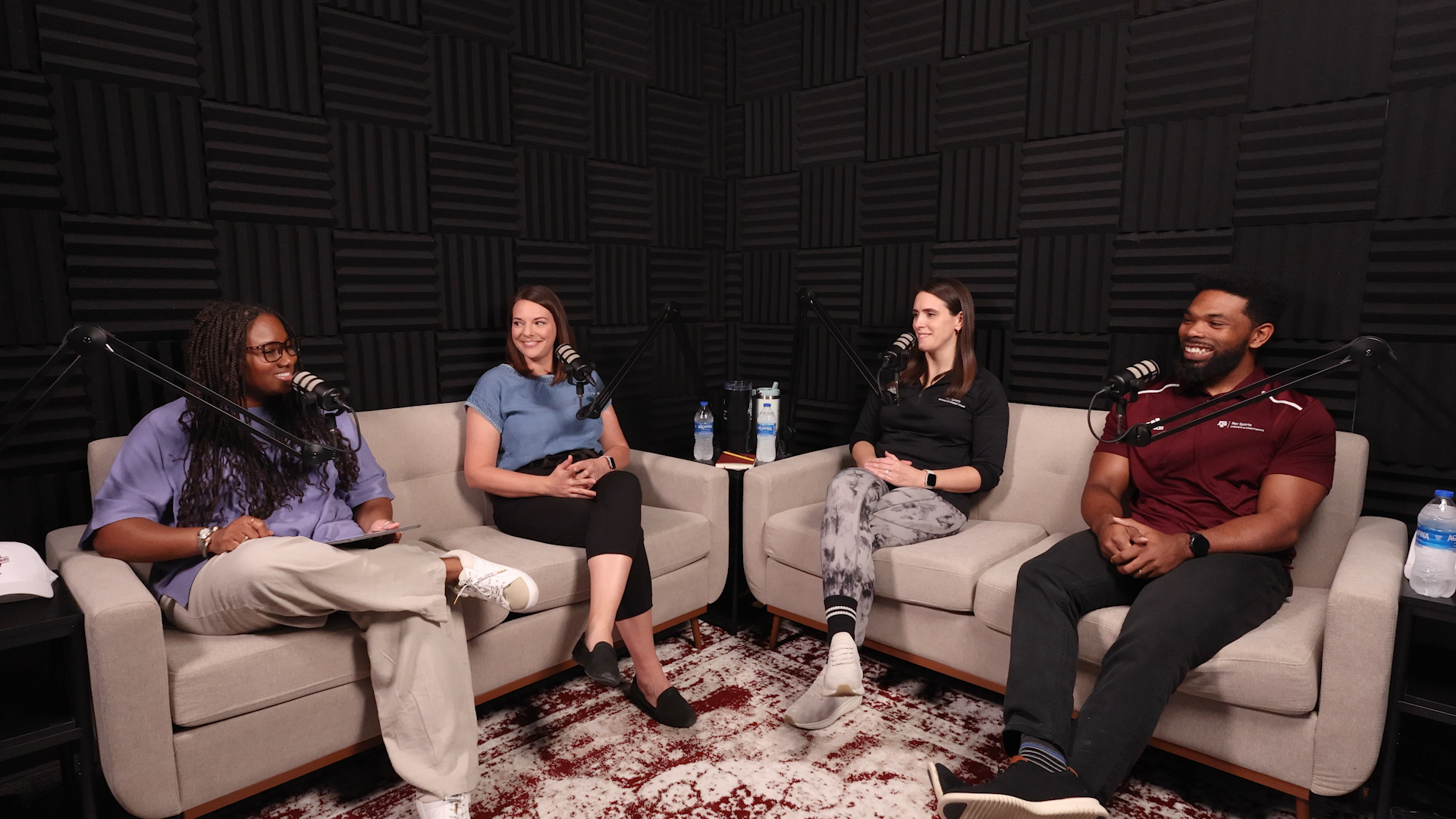Wellness Wisdom for Thriving at Texas A&M
Eight well-being tips any Aggie can use this Mental Health Awareness Month and beyond.
By Melissa Rynning, Texas A&M Division of Student Affairs

For Mental Health Awareness Month, we sat down with mental and physical wellness professionals from Texas A&M, Anna Taggart, DJ Scott and Megan Culpepper for an episode of On Air with Student Affairs to share some encouraging, practical advice with Aggies.
Being in college can bring a lot of amazing new experiences, there’s definitely a reason why it can be one of the best times in life. Meeting friends, pursuing your interests, having a calendar full of events you actually want to go to - it’s all exciting. The opportunities to find your way can be endless.
But the flip side is that life in college also comes with new challenges. Managing a tight budget, exams, and trying to find a good internship or job. Meeting new people and social pressure. Time management between school and life. It can be a lot.
It’s easy to see how prioritizing wellness, both physically and mentally, can fall down the list when there’s a million other things to do. Many students find themselves in a place where they are having struggles, but may not know how to identify them, address them and work through it. If that’s you, we want to say this experience is normal - and you’re not alone in the struggle.
If you’re experiencing stress, anxiety, overwhelm, negative thoughts or feelings of depression, you’re not alone.
To help Aggies get through all the highs and lows of their time at Texas A&M, Anna, DJ and Megan shared their best tips and advice for Aggies during an episode of the On Air with Student Affairs podcast, and we’re passing on the wisdom.
Managing wellbeing during stressful times at Texas A&M: Eight helpful tips from Anna, DJ and Megan.
Despite how daunting it can feel at times, it's definitely possible to manage stress, work through negative emotions and build resiliency during your time at Texas A&M. We’re sharing some practical steps any Aggie can take towards better mental and physical wellness - even in the overwhelm that happens during life at college.
Meet Your Wellness Specialists from Recreational Sports and University Health Services
 Anna Taggart | Director, Fitness & Wellness, Recreational Sports
Anna Taggart | Director, Fitness & Wellness, Recreational Sports
About me: “I love mentoring students, helping them learn and grow and seeing them accomplish things they never thought they could! Fun fact about me: I was on ESPN in college for obstacle course racing.”

DJ Scott | Assistant Director, Strength and Conditioning, Recreational Sports
About me: “Helping students figure out what they are capable of is why I do what I do. Perspective is just half the battle. Fun fact: I've trained a lot of clients over the years and my youngest was five years old and my oldest was 100.”
 Megan Culpepper | Professional Counselor, Counseling & Mental Health Care at University Health Services
Megan Culpepper | Professional Counselor, Counseling & Mental Health Care at University Health Services
About me: “I love being a college counselor because I get a front-row seat to students’ lives - their struggles, yes - but also their strength and growth and that’s an honor. I’m a wife and mom, I love the outdoors and the Texas hill country. Fun fact: I am hoping to hone my pickleball skills more in the future.
1. Find your support.
Megan Culpepper: “Chances are, the support system you relied on in high school might have changed a bit. Do you have friends, classmates, professors, family that you can mutually share what is going on in your life, how you’re really doing and what is stressing you out? Going through challenges and mental health struggles in college is a normal experience, so don’t stay silent or assume what you’re going through is too much of a burden to share. When in doubt, ask if it's okay to vent to others and you’ll find a confidant you can trust.”
2. Make an action plan to address things you’re stressed about.
Anna Taggart: “Is it finding a job? Set a goal to apply to a certain number of jobs per week. Is it moving your body more? Set aside a few days a week to exercise in some form or a workout routine you can stick to. I find it's best to get this stuff out of your head and onto paper. Write out a list of what is stressing you out and a few objective bullet points you can do to take small steps towards, putting those big, stressful things that feel unobtainable into perspective.”
3. Use your calendar to your advantage.
DJ Scott: “Don’t only schedule your time for the important tasks, like homework, studying, work, working out, etc., but also make sure you don’t overschedule. Leave buffer time so you can take breaks and schedule in ‘me’ time or time with friends.”
4. If you're overwhelmed, take a step back.
Anna Taggart: “Take a step back and address all your basic needs. Are you eating right, sleeping enough and taking breaks? I emphasize the importance of sleep to every student I work with. Don’t pull all nighters, know your limits and how much sleep your body needs to feel good. Also, sometimes the easiest way to overcome overwhelm is to just take a short walk outside with your dog, with friends or alone with your headphones and favorite songs.”
5. Identify healthy outlets.
DJ Scott: “It’s not cliche to say that moving your body and exercising is connected to overall health and mental wellbeing, so what activities do you love to do? Could that be going to a group fitness class at the rec? Hitting up the weight room (no bias here 😉)? But my advice is don’t always default to drinking to celebrate or cope, really try and find healthy outlets that add to your life and what you love to do.”
6. What negative thoughts can you challenge?
Megan Culpepper: “Our thought life can really impact our mental health. It’s important to note that not all thoughts we have are helpful. If you wouldn’t speak it out loud to your friends or family, why would you say it to yourself? Challenge self-defeating thoughts. Choose to think about positive outcomes instead of worst-case scenarios.”
7. Know the signs you may need to talk with somebody.
Megan Culpepper: “If you need to seek professional counseling, that’s more than okay. Having a counselor/therapist is a useful tool for anybody, but if you’re finding that your mental health is interfering with everyday life, like your school work, relationships or your job, it might be time to talk with someone who can help you unpack what’s going on. Also, if you, your friends and family, or professors are noticing a change in your behavior, motivation or emotional state, that could also be an indicator that you should speak with a counselor. If you’re having a life-threatening emergency or crisis, it’s important that you get help right away and call 911.”
8. Know that what you’re going through is not your identity.
DJ Scott: “College is a really important time in life where we can really start to form our identity and start becoming who we want to be, but I want to emphasize to students that struggles don’t last forever and what you are struggling with is not your identity. In fact, most of the time struggles and tough times are an opportunity that can make you stronger and give you tools you can use to overcome things for the rest of your life.”
Listen to the full episode of On Air with Student Affairs and others on the Division of Student Affairs website.
To utilize mental health services provided by University Health Services, visit the UHS website.
To explore Recreational Sports fitness offerings, visit the Rec Sports website.

